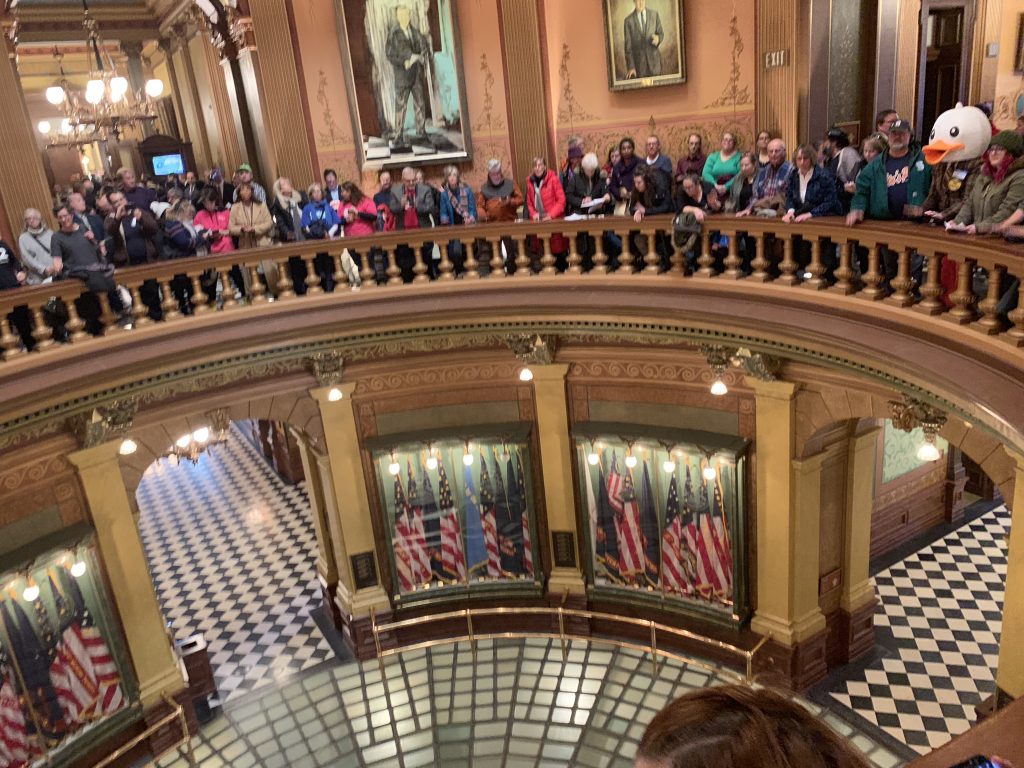Lawmakers Look to Curb the Chaos of Lame Duck Sessions at the State Capitol
Government transparency and ethics groups are excited about the prospect of lame ducks on their last legs.

There’s movement at the state Capitol toward putting limits on the Legislature’s lame duck session. That’s the time just after an even-year election that often sees hundreds of bills passed, often in the dead of night and with little review.
As part of the weekly series MichMash, WDET’s Jake Neher and Slate’s Cheyna Roth talk about why transparency activists are excited about curbing the chaos of lame duck.
Subscribe to MichMash on iTunes, Spotify, Google Podcasts, NPR One or wherever you get your podcasts.
It’s a time when many people are term-limited or they just lost an election, and they don’t have a lot of accountability to voters. It’s almost universally despised because it causes controversial bills to be rushed through in a short amount of time, with little chance of debate or legitimate oversight. That’s especially true when a political party is losing either the governor’s office or a chamber like we saw a couple years ago in 2018.
But there could be a change on the horizon that would limit the passage of bills during lame duck sessions.
A constitutional amendment in the state Legislature would require a two-thirds majority vote to pass any bill following a November election in an even-numbered year. That legislation has cleared the state House with an overwhelming bipartisan majority.
This is something that has been tried before. Rep. Gary Howell (R-North Branch) has been trying to rally his colleagues to end the mass bill hysteria of lame duck for years, but with no luck.
“We’re really, really excited to see the Legislature taking up these issues to make our government more accountable, and hopefully to build trust in people in our institutions.” — Nancy Wang, Voters Not Politicians
But things are different this time around. Not only did the House pass the amendment by an overwhelming margin, new House Speaker Jason Wentworth (R-Farwell) sponsored the joint resolution. This has transparency activists really excited.
“On such a broad kind of bipartisan basis, we think that’s a really great sign,” says Nancy Wang, executive director of Voters Not Politicians. That’s the group that was behind the 2018 ballot initiative to create Michigan’s new independent redistricting commission. Wang says the group has a new set of proposals that they’re pushing, including restricting lame duck.
“These ethics and transparency and accountability reforms is something that Voters Not Politicians has been advocating for, for over a year now. Because these are the kind of anti-democratic practices that kind of pit party against party, but don’t work for the voters,” she says of lame duck.
Wang also says the move would help “make our government more accountable, and, hopefully to build trust in people in our institutions.”
But while the idea has gotten further than in years past, it still has a long way to go. The Senate needs to pass the measure, and if it makes it out of the Senate it would have to be approved by the voters because it’s an amendment to the constitution.
Getting the measure out of the Senate could be more difficult than in the House. Many Republicans in the House are newer to the Legislature and don’t have the lame duck experiences that many lawmakers in the Senate have. Many Republican members of the Senate have been a part of Lame Duck sessions and used the time to their advantage.
Trusted, accurate, up-to-date
WDET is here to keep you informed on essential information, news and resources related to COVID-19.
This is a stressful, insecure time for many. So it’s more important than ever for you, our listeners and readers, who are able to donate to keep supporting WDET’s mission. Please make a gift today.
